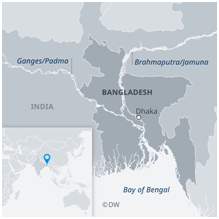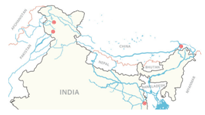

Context
After 11 long years since the last highly potential chance was shattered, hopes resurfaced that Dhaka and New Delhi may sign the long-awaited Teesta water-sharing dealvery soon.
Background
- The draft of the Teesta water distribution was finalized and signed by the water resources secretaries of both countries in early 2011.
- But the then prime minister Manmohan Singh could not sign it on September 6 that year owing to a last-minute objection from West Bengal State Government.
Analysis
What can be expected now?
- There is a strong possibility that an agreement on the Kushiyara river that flows from Assam into Bangladesh.
- India and Bangladesh have 54 transboundary rivers that are part of the drainage system of the Ganga-Brahmaputra-Meghna (GBM) basin.
- This accord will expire in
- As a result, the issue of water distribution of the Teesta River will take precedence.
- Apart from this, Feni, Manu, Muhuri, Khoai, Gomti, Dharla, and Dudhkumar rivers will also be discussed.
Historical Background of India and Bangladesh Conflict:
- In 1961, India released plans to build the Farakka Barrage seventeen kilometers upstream from the border of Bangladesh.
- The purpose of the barrage was to divert water from the Ganges to reduce silt build-up in Calcutta Port.
- Diversion of water from the Ganges had severe consequences on water availability downstream in Bangladesh.
- Changing rainfall and water use patterns upstream in Nepal have since further exacerbated water stress along the Ganges, leading to the inequitable distribution of water based on the requirements of the 1996 treaty.
- Diplomatic relations regarding water cooperation remain contentious.

|
India and Bangladesh established the Indo-Bangladesh Joint Rivers Commission in 1972. |
What is the Teesta River Dispute?
- This dispute is regarding water sharing of River Teesta. Currently, India has more water share than Bangladesh.
<tableclass="table table-bordered">
About Teesta River:
- The Teesta Riveroriginates in the Teesta Kangse glacier and flows through the state of Sikkim and West Bengal before entering Bangladesh.
- Teesta River is a tributary of the Brahmaputra River.
- Brahmaputra River is called Jamuna River in Bangladesh.

- Brahmaputra River is called Jamuna River in Bangladesh.
- Teesta River crosses the Rangpur region of Bangladesh and joins the Jamuna River at Chilmari.
- Teesta is a 414km long river flowing through the Indian states of West Bengal and Sikkim.
- It is the fourth largest transboundary river shared between India and Bangladesh after Ganga, Brahmaputra, and Meghna River Systems.
- Total catchment area: 1.75 million sq. km.
Teesta River Dispute: Timeline of the Negotiation Events
- 1972: Joint River Commission (JRC) was established by India and Bangladesh in the Indo-Bangla Treaty of Friendship.
- 1983: According to the agreement, the Ad-Hoc sharing is valid until 1985.
- 1984: Bangladesh’s share increased based on the hydrological data.
- 1998: Bangladesh started the Teesta Barrage irrigation project (3 cropping seasons per year).
- 2011: An Interim deal that was supposed to last for 15 years - gave India 42.5% and Bangladesh 37.5% of Teesta water.
Importance of Teesta River to Bangladesh and India:
- According to the report of the Asian Foundation in 2013, its flood plain covers about 14% of the total cropped area of Bangladesh and provides direct livelihood opportunities to approximately 73% of its population.
- Teesta is the lifeline of North Bengal and almost six districts of West Bengal are dependent on the waters of Teesta.
Bangladesh’s stand on the Teesta River Dispute:
- India already enjoys a share of 55% of the river water.
- Bangladesh claims 50% of the water between December and May every year because that’s when the water flow to the country drops drastically.
- Over 1 lakh hectares of land in Rangpur - its rice bowl cannot be cultivated for winter crops due to excessive withdrawal of water by India.
- Bangladesh demands a fair share of river waters during the dry season.
Conclusion
Bangladesh is a significant neighbouring country of India with a shared history, culture, religion, and many more common elements. Bangladesh is an essential element for India to get connected with North East.
India needs to take proactive steps on the River water agreement considering the strategic importance of Bangladesh.



